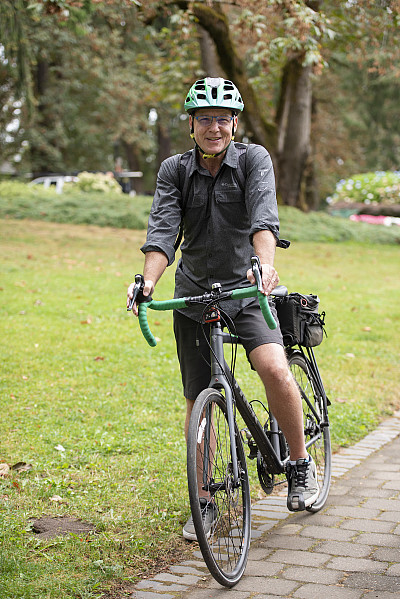Upon Retirement: Professor Mortola Reflects on the Noble Profession of Teaching
Several longtime professors retired from Lewis & Clark this year. Q&As with each retiree will be published in The Source throughout the summer. Check out the employee comings and goings archive for a full list of those who joined our community recently and those who said a fond farewell.

In the following Q&A, Mortola looks back at his teaching career and shares his future plans:
What was your path to Lewis & Clark?
It was my mother! After I got my doctorate in California, I was offered a couple of jobs in the midwest and then almost accepted one at the University of Southern Mississippi, dreaming of weekends in New Orleans. However, my mother had to undergo treatment for cancer in California, so I called the colleges in the west that I hadn’t heard from yet and LC happened to be on that list. It was one of those auspicious moments: the Graduate School had just had a favored candidate for the position in the School Psychology program back out and I was offered an interview. When they showed me the tables in the library that overlooked the fern garden, I was hooked. And my mom got better too.
What was your favorite course(s) to teach?
Before I arrived, I remember asking if I could teach the Group Counseling with Children course because I had experience in that area. I just completed my last section of that class 26 years later. My colleague Diane Gans and I wrote a book about our work offering this class in a local middle school with our graduate students running counseling groups for more than 100 sixth grade students a year: It’s called the Belong and Be You curriculum. Honestly, though, my true favorite class to teach is one that I developed based on the Gestalt Play Therapy approach of Dr. Violet Oaklander entitled Play Becomes Real. I am excited that I will continue to teach it as an adjunct in the years to come.
What did you enjoy most about your work?
The thing I most appreciated about my work at LC was the combination of two things: The monk-like engagement in reflection, study and writing combined with the activist-like engagement in the vitally-important public schools in our area. Ever since I arrived at LC, I’ve had a copy of Dürer’s St. Jerome in his Study hanging on my office wall and I have often reflected on how fortunate I have been to have this life and this kind of work.
What changed the most during your time at Lewis & Clark? What remained constant?
I can remember the big, round grass lawn between the Manor House and the Gym being a parking lot. I can remember the grad school when it was part of the CAS campus. One thing that has remained constant is how the months of rain and clouds in the PNW are great for getting work done.
What’s something people might not know about you?
That 26 years ago I used to have to slip through the gates of the cemetery at night after class on my bike before they happily made us an official, and lovely, bike-commuting route.
What is your favorite place on campus?
Either the Trail Room at lunch in the fall when the Maple leaves are falling, or the sloping lawn at the grad school that ends under the walnut trees, near the bee hives.
What are you most proud of?
I have been reflecting lately on what it takes for teachers to be willing to stand up in front of a group, be prepared, pay attention to each person in the room, make the discussion as democratically dispersed as possible, stay on focus, be firm, be smart, and smile. I am proud to have contributed to this noble profession.
What’s next for you?
Professor Emeritus was always a bit of a mystery to me. I now imagine it as much the same meal, but with smaller portions. I will continue to teach as part of the Violet Solomon Oaklander Board (for which I am president-elect) and offer electives and workshops through LC. I have begun to put together a book entitled empathy for things, in which I will try to help us better understand boys and men in counseling and educational contexts. I will work to remain grateful for the small, but important things in life: family, friends, activity, health, nature.
More The Source Stories
email source@lclark.edu

